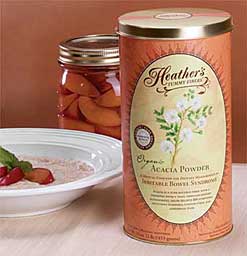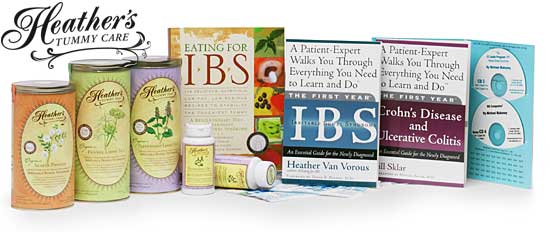| |
 |

Peppermint Oil Caps called "Drug of Choice"
For IBS patients with constipation or diarrhea, to alleviate general symptoms, and to improve quality of life
In This Issue...
Food & Recipes
Special Letters
Rx News & Research
Ask Heather
In the Next Issue...
New stores with Heather's Tummy Care products!
Did you miss the latest
IBS newsletter and
Raspberry Angel Kisses?
Past issues
are posted here!
|
 |
|
| |
Heather's IBS Newsletter ~ For Irritable Bowel Syndrome
April 18, 2006
Can IBS be Liberating?! Overcoming IBS & Antibiotics
Hello to everyone -
This week we have an inspiring reader letter that asks a very provocative question - could IBS possibly be liberating? It certainly seems impossible to even imagine if you're newly diagnosed, or long-diagnosed but still struggling. But - this letter makes a very convincing case for how IBS can actually allow for changes to someone's life that are for the better. Read for yourself and let me know what you think!
We also have several interesting new research studies and findings, and an "Ask Heather" column that features a guest letter from someone who makes it quite clear just why IBS is not always the right diagnosis after all.
Finally, we're looking forward to a very exciting newsletter for our next edition. We have a wealth of new stores and medical practices to announce that have added Heather's Tummy Care products.
We are constantly striving to improve all of our education, support, availability, and products so that we can help the widest range of people with IBS, to the very best possible extent. We'll keep you posted!
Best Wishes,
Heather Van Vorous
Did a friend send you this newsletter? Sign up here for your own free subscription. 
Crunchy Lemon Muffins
These muffins are just plain yummy. They're sweet-tart, with a luscious moist interior that proves low fat, digestion-friendly baking can be totally delicious. Whip up a batch and prove it to yourself.
Preheat oven to 400F.
Sift together in a large bowl and then blend with a wire whisk:
2 c flour
2 t baking powder
3/4 c sugar
Combine in a medium bowl:
3 T applesauce
1 T canola oil
2 egg whites
1 c soy milk
grated rind of 1 large lemon (try using the small hole side of a cheese grater)
Add wet to dry ingredients and stir until just combined.
Divide batter evenly between 12 medium muffin pans that have been lightly sprayed with cooking oil. Bake for about 12 minutes, just until done.
While muffins bake, combine 1/4 cup fresh lemon juice with 1/4 cup sugar until sugar dissolves. Drizzle this syrup over muffins as soon as they are removed from the oven, let muffins sit for just a few minutes, then remove muffins from hot pan and cool on a rack.
Are you just learning how to eat for IBS? A little intimidated at the thought of special IBS recipes? Not quite sure just what makes these recipes special in the first place? Don't worry! Come see the IBS Diet pages, and find the answers to all your questions.
~ Heather's Tummy Fiber ~
For the Dietary Management of Abdominal Pain, Diarrhea, &, Constipation

Organic Acacia ~ Pure Soluble Fiber
The prebiotic fiber that relieves both diarrhea and constipation!
 Can IBS be Liberating?! Overcoming Antibiotics and IBS
Can IBS be Liberating?! Overcoming Antibiotics and IBS
Heather,
As you have been immersed in the subject of IBS since you were a child I am not sure what your experience or knowledge is with the coincidence of IBS and extended antibiotic use. I have not heard you speak a lot about it. So, I am writing to share with you what I have learned since being diagnosed with IBS August of 2005.
I was on 4 antibiotic treatments from March 2005 to June 2005. My doctor at the time (from an HMO health plan) advised that it may be a virus that needed several treatments of antibiotics to wipe out the virus entirely. I was never tested for anything during that period of time other than giving them a stool sample which came back negative.
After getting a new doctor (a real one) I was sent for many tests, including x-rays, allergy tests, and upper/lower GIs. You know the conclusionÖthat by exclusion I was diagnosed with IBS and gastritis.
When the term IBS was first suggested back in July 2005 I began to research it and thatís when I came upon your site. I have been using ALL of your products and advice since the beginning, including buying the cookbook, the First Year:IBS book, hypnotherapy CDs, and cutting out ALL triggers.
I realize that every body reacts differently in terms of triggers and good advice for some may not be for others. Still, in this short time it has been my frustration, as Iíve posted different help tips (that are working for me) on the message boards, to see such skepticism to a holistic approach to wellness. In addition, Iíve been just slack-jawed that people are not taking advantage of your products, specifically because YOUR products are pretty much universally acceptable to IBS sufferers. Itís a no-brainer to me that feeling good feels...well, really good!
But even before using all of your products I learned about probiotics. I began taking them on a daily basis (twice per day) and felt immediately better (more energy and nausea gone). I learned what antibiotics do to the body and how probiotics work in the body (not supplements, but the bodyís natural probiotic system). Hence, it made sense that when taking antibiotics that one should also incorporate probiotics to replenish the good bacteria that the antibiotics were destroying as well as the bad.
Since August Iíve continued to research the subject, read your boards regularly, and speak to people who have IBS as the opportunity arises. I am hearing the same thing over and over again, that IBS followed lengthy antibiotic treatments. The interesting thing is that these IBS sufferers do not connect the IBS with the preceding antibiotic treatments until I ask them about it. Itís amazing to me that doctors are not aware of what an onslaught of antibiotics do to a body as it is, simply, a function of cause and effect.
And in general, I am meeting children with IBS whose mothers donít realize they have it, and neither do their doctors. My heart goes out to them as I know they have suffered for so long. I continue to educate as well as I can and to send them to your site for more information.
Perhaps I am a rarity, but there is a lot to be said for having a positive attitude and being pro-active in oneís state of health. In fact, Iíve actually found IBS to be liberating. I have learned how to eat better, how my body works, to exercise more, how to use more natural methods of treatment (instead of prescription medication), and to be grateful for what I do have each day. And, I have learned that IBS does not have to dictate my life.
I am writing like letters to all of my doctors in hopes that this information will encourage them to learn more about IBS and antibiotics, and IBS in general. I hope my experiences and thoughts will be of benefit to you, as well, as you continue to be the hope and guide of thousands, if not millions, of IBS sufferers in the world. I am also thinking of starting a local outreach group.
Sincerely,
Jacque OíMara, Orlando, Florida, IBS-C (and slowly coming out of it)
Thank you SO much, Jacque! There is definitely evidence that antibiotics can radically upset the gut and trigger the onset of IBS, and there's also a growing number of studies showing that probiotics can be very helpful for a wide range of IBS symptoms. You're on a great track, and I'm so grateful you have shared your information and experience. I know this letter will help many others. ~ Heather
Did you miss the last reader letter? Find it here...
Fennel Tummy Tea for Bloating & Gas
 
Fennel helped end 3 years of IBS bloating! Read this terrific letter to learn how.
 Prevalence of IBS and Depression in Fibromyalgia
Prevalence of IBS and Depression in Fibromyalgia
A recent study at the Department of Gastroenterology, Naval Medical Center San Diego, San Diego, California attempted to determine the point prevalence of depressive symptoms, and irritable bowel syndrome (IBS), in patients with fibromyalgia (FM).
The prevalence of IBS in FM patients 63% - 81%, depending on diagnostic criteria used. The prevalence of IBS in controls was 15% - 24%. Depressive symptoms were met in 40% of FM patients and 8% of controls. The study noted that prevalence of IBS and depressive symptoms was higher in FM patients compared to the control population, and suggested that identification of IBS and depressive symptoms in FM patients might enable clinicians to better meet the needs of this patient population.
Go here for more information about this study...
Older Versus Younger Patients with Irritable Bowel Syndrome
A recent study at the Department of Medicine, Division of Digestive Diseases, University of Mississippi Medical Center, Jackson, Mississippi studied the prevalence as well as the sociodemographic characteristics and quality of life (QOL) of adults over age 50 with IBS and compared it to their younger counterparts'.
The prevalence of IBS was similar in the two groups regardless of race, sex, marital status, size of household, location of residence (rural versus urban), level of educational status, and household income. Compared to the older group, there was a trend toward a higher prevalence of IBS among divorced subjects and those below poverty level of income in the younger subjects. In contrast, older IBS patients were more likely to attend church regularly.
There were no differences in traveler's diarrhea, food intolerance, and drug allergies between the two groups. Health care utilization was similar between the two IBS groups in terms of number of physician visits, use of prescription and alternative medications, and being disabled due to IBS. There was no difference in the overall QOL score means or in its general health and physical functioning components. However, older IBS patients had better social functioning.
Although in this study IBS occurred less frequently among older adults than among younger patients, the difference is not statistically significant. While IBS affects QOL at all ages, social functioning was actually better on average among older compared to younger IBS patients.
Go here for more information about this study...
Intestinal Serotonin Signalling in IBS
A recent article noted that alterations in motility, secretion and visceral sensation are hallmarks of irritable bowel syndrome. As all of these aspects of gastrointestinal function involve serotonin signalling between enterochromaffin cells and sensory nerve fibres in the mucosal layer of the gut, potential alterations in mucosal serotonin signalling have been explored as a possible mechanism of altered function and sensation in irritable bowel syndrome. Elements of serotonin signalling that are altered in irritable bowel syndrome include: enterochromaffin cell numbers, serotonin content, tryptophan hydroxylase message levels, 5-hydroxyindoleacedic acid levels, serum serotonin levels and expression of the serotonin-selective reuptake transporter. Both genetic and epigenetic factors could contribute to decreased serotonin-selective reuptake transporter in irritable bowel syndrome.
Additional studies will be required to gain a more complete understanding of changes in serotonin signalling that are occurring, their cause and effect relationship, and which of these changes have pathophysiological consequences.
Go here for more information about this study...
Gender-Related Differences in Irritable Bowel Syndrome
A recent article in Journal of Gastroenterology and Hepatology noted that Irritable bowel syndrome (IBS) is more common in female subjects, and IBS patients generally exhibit reduced pain thresholds to rectal distension.
Fifty-nine IBS patients (age 20Ė65 years; 31 women, 28 men) with symptoms that fulfilled Rome-II criteria and 21 healthy controls (age 25Ė58 years; 11 women, 10 men) were recruited. Participants completed a questionnaire regarding bowel symptoms and psychological distress, and maximal tolerable pressures were evaluated via barostat tests. Results:
Although healthy women appear to have lower perception thresholds than men, significant gender differences in pain sensitivity were not detected. In addition, female patients with IBS also exhibited no enhanced colorectal perception, as compared with male IBS patients. Therefore, the increased prevalence of IBS in women may be related to another set of pathophysiological factors, and not to gender-related differences in visceroperception.
Go here for more information about this study...
Patient Survey for Interstitial Cystitis
Researchers have long noticed connections between IBS and Interstitial Cystitis. New York Urological Associates has created a web based patient survey of cystitis patients, asking whether the standard urological tests and treatments for cystitis have improved their symptoms, made them worse or had no effect. If you would like to participate, please see the survey at Cystitis Answers from Patients.
Looking for more IBS research and news? Check the IBS Research Library!
~ Heather's Tummy Tamers ~For the Dietary Management of IBS Abdominal Pain &, Bloating

Peppermint Oil Caps with Fennel and Ginger Are Amazing!
Our Peppermint Oil Caps with the added benefits of fennel and ginger oils help prevent abdominal pain, gas, and bloating!
 IBS Self-Diagnosis IBS Self-Diagnosis
"Is it really that important to see a doctor for a diagnosis of IBS?"
I receive countless letters asking me this question, and I think almost everyone is hoping to hear that the answer is "no". Unfortunately, that would be the wrong answer. There's not a lot your doctor can do for you if you do, in fact, have a legitimate diagnosis of IBS, as this is a disorder that requires patient self-management to control symptoms. (This is a good thing, actually, as it puts control over IBS directly in your own two hands, and you can personally make a world of difference in how you feel every single day.)
However - getting to this point requires that you first have other medical conditions, which can often mimic IBS, ruled out. There is simply no way to do that without seeing a physician (preferably a board-certified gastroenterologist) and having some tests run, and all of your symptoms thoroughly evaluated.
Almost every time I tell someone this, they respond by doubting that it's really that important. After all, if their symptoms pretty much sound like IBS, what else could it really be?
I'd like you to hear from someone who knows first-hand one possible answer to this question. Kristy Manning has very graciously shared her story, and advice, for people who are in this situation.
"I hate to have to post this, but I think it's very important that people who visit the HelpforIBS.com site have the opportunity to be educated about a very serious condition that could be mistaken for IBS.
Yesterday I was diagnosed with Carcinoid Cancer, a rare, neuroendocrine disease that generally begins with a tumor in the gut or lungs. These tumors are slow-growing and release serotonin into a person's system. Unfortunately, the symptoms of Carcinoid usually do not emerge until the cancer has already metastasized to the liver, at which point that patient experiences some or all of the following:
1. Abdominal pain
2. Facial flushing
3. Diarrhea
4. Heart palpitations and other symptoms of anxiety or panic attacks.
Over the past few months, I have posted several messages to the IBS Message Boards regarding my experiences with these types of symptoms, particularly the anxiety/panic attacks as well as the fact that my abdominal pain manifested itself a little differently (e.g., usually occurring at night) than that of most IBSers. About six weeks ago, I went to my gastroenterologist's office for a routine appointment, and apparently my liver was a little enlarged. Two blood tests, one CT scan showing tumors in my liver, and one liver biopsy later, the diagnosis came in yesterday. I've since spent a large amount of time on carcinoid websites and have joined an online support group. What I've learned is that MANY people with carcinoid were originally diagnosed with IBS, and that for most, it took years to arrive at a final diagnosis.
The good news is that because these tumors are so slow-growing, for most patients the prognosis is fairly good despite the involvement and compromise of the liver. Even though I've likely had this for many years already, I'm optimistic about my own prognosis. There are many promising treatments available, and even more under development.
Anyway, I wanted to post this as an alert to people suffering with IBS. If you are experiencing facial flushing in particular, as well as any of the other types of symptoms I have listed above, don't necessarily assume that it's a sign of perimenopause, as I did (I'm 43). There are some fairly simple tests that are available to help rule out this rare disease. If you would like to learn more about Carcinoid Cancer, visit www.carcinoid.org, or e-mail me directly at kmanning@mindspring.com.
Finally, many of the approaches to managing the symptoms Carcinoid are similar to those for IBS - diet, relaxation techniques (including hypnosis), etc. I plan to incorporate much of what I've learned from this wonderful website into the next stage of my health management.
Thanks for listening,"
Kristy Manning
A huge thank you and many hugs to Kristy for so generously sharing her story. ~ Heather
Did you miss the last "Ask Heather"? Find it here...

Shop at Heather's Tummy Store for IBS
HelpForIBS.com
The only store that's just for IBS - so we only carry the very best

You're on this newsletter list because you have expressed interest in IBS news and information.
Change your newsletter email address here.
If you are viewing this newsletter on a website and would like to subscribe for email delivery, please "Join the IBS Newsletter" here.
ANTI-SPAM PRIVACY & SECURITY POLICY
HelpForIBS.com
Heather's Tummy Care
80 S. Washington St, #304
Seattle, WA 98104 USA
© 2006 Heather Van Vorous, Heather's Tummy Care. All rights reserved.
USA Copyright Office Registration Number TXU 1-270-858 and others
|
|
| |